Enlargement's Return From the Dead?
Adelina Marini, November 15, 2017
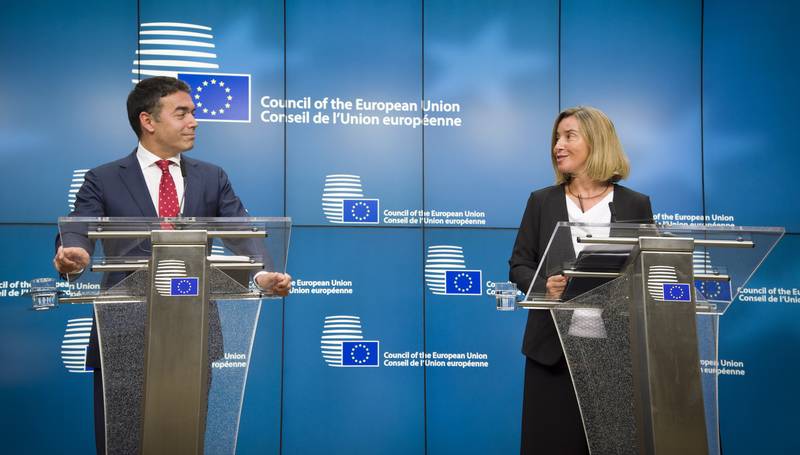 Over the past two to three months, a major change is observed in the dynamics of the enlargement process, putting an end to the rather bleak forecasts regarding the European prospects and the stability of the turbulent region of the Western Balkans ... for now. What is new? Macedonia is returning with enormous ambition and high speed on the European path, Serbia is changing the record, Montenegro is breaking from Russia's grasp, the European Commission is stepping up, member states are starting to pay more attention to the region and to participate actively in the processes that drive it. Although the process remains frozen for Turkey, and there are still problems in the Balkans, the largest of which is Bosnia and Herzegovina, it can be said that the European integration is back in the game.
Over the past two to three months, a major change is observed in the dynamics of the enlargement process, putting an end to the rather bleak forecasts regarding the European prospects and the stability of the turbulent region of the Western Balkans ... for now. What is new? Macedonia is returning with enormous ambition and high speed on the European path, Serbia is changing the record, Montenegro is breaking from Russia's grasp, the European Commission is stepping up, member states are starting to pay more attention to the region and to participate actively in the processes that drive it. Although the process remains frozen for Turkey, and there are still problems in the Balkans, the largest of which is Bosnia and Herzegovina, it can be said that the European integration is back in the game.
A second chance for Macedonia
The most radical one is the change in Macedonia, which had begun to become a black hole in the Balkans after VMRO-DPMNE's prolonged authoritarian rule and the severe political crisis in the country that had been running for more than two years and reached its climax at the end of April with the bloody attack on the parliament in Skopje. Much has changed since then. The country has a new government that was met with scepticism, but has already made giant steps compared to the past 12 years. The first task of Prime Minister Zoran Zaev's government was to return Macedonia onto its European path, which required winning the two neighbouring countries - Greece and Bulgaria - to its side.
With Greece solution is needed to the dispute about the name of the former Yugoslav Republic - a process which was moving under the auspices of the United Nations, but has been virtually frozen. The government in Skopje is pursuing an active policy of restoring the confidence of Athens with full awareness that it will be a very difficult task. The second challenge was the negotiation of a friendship agreement with Bulgaria, which has for years been a hindrance in the relations between Skopje and Sofia. The agreement is now a fact after the announcement on Wednesday (July 26th) that the two countries have concluded the negotiations and the text of the treaty has been published [in Bulgarian]. The signing ceremony will take place on 1 August in Skopje. The text of the treaty will be signed in two languages - Macedonian and Bulgarian, which is part of the compromises that the Bulgarian side did.
In the words of Prime Minister Zoran Zaev, with this agreement both sides have made compromises and are equally satisfied or dissatisfied. After signing, the next step is the ratification process, which will hardly go without problems in both countries, yet the treaty is a huge step forward for both states. With it, one of the barriers to Macedonia's EU integration will be removed. Prime Minister Zaev hastened to open the European perspective of his country as soon as possible in order to be able to take on internal reforms that would be much more difficult and heavier, having an opposition that was prepared to do anything, even at the cost of an ethnic conflict, in order to preserve its power.
In June, EU Enlargement Commissioner Johannes Hahn (Austria, EPP) kicked off regular monthly press conferences to account for the work in his portfolio, which, besides enlargement, also includes policy towards the EU's neighbouring countries. The first press conference at the end of June was devoted namely on enlargement. At that time he was quite reserved, stressing that elections and formation of a new government are not enough for the Commission to renew its recommendation to start negotiations with Macedonia, which have been blocked for more than a decade because of Greece's veto.
The Commission began issuing recommendations in 2009, but ceased in 2015 because of the crisis in the country. Since then, the condition was set to fully implement the Pržino agreement and to make significant progress on the reform agenda. Johannes Hahn said in June that he hoped that what was going on in Skopje was really a change of mindset, and that if Macedonia were to fulfil its share of the deal, Europeans should respond. He then admitted that 12 years ago Macedonia was the best pupil in the class, but it is no longer, and the responsibility for this to some extent lies outside the country. "The fact that there was a lack of concrete perspective has certainly influenced the situation inside the country and this is simply the point I have raised, 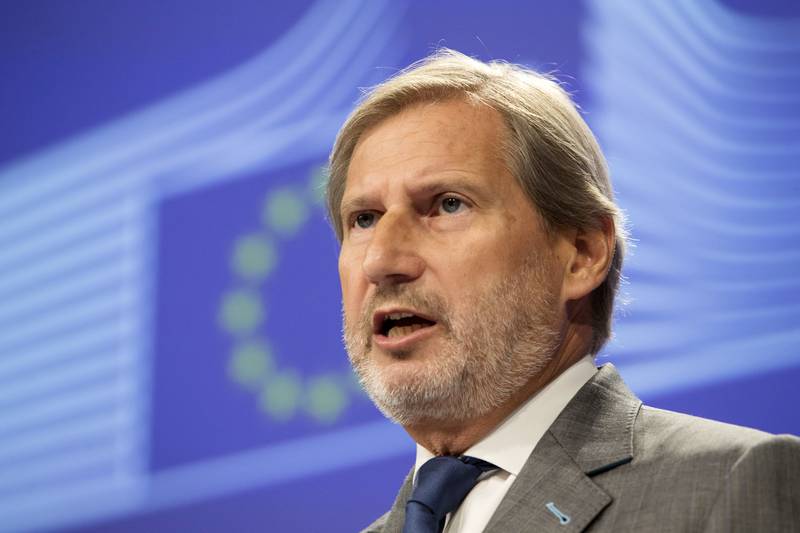 and therefore I think, in particular, neighbours should have an interest to contribute in their own interest in stability and inclusion of this country at least in the future to the EU", were Hahn's words on June 12th.
and therefore I think, in particular, neighbours should have an interest to contribute in their own interest in stability and inclusion of this country at least in the future to the EU", were Hahn's words on June 12th.
Only a month later (July 18) the first Stabilisation and Association Council with Macedonia in a long time took place. The last one was in 2015. The atmosphere was completely different. EU High Representative for Foreign Affairs and Security Federica Mogherini (Italy, Socialists and Democrats) said there was a new sense of optimism and a new beginning for the country. She praised the government for the steps it has taken towards its neighbours. Johannes Hahn took on the role of the bad cop reminding that Macedonia is expected to work on the implementation of the Pržino agreement and the urgent reforms, stressing that this “is not an invitation for rushing legislative proposals through the Parliament". It is important to have proper consultations.
Macedonian Foreign Minister Nikola Dimitrov said this was the second chance the country receives after "a long, severe, moral and political, and institutional crisis". The main priority of the government, he said, is the establishment of independent and functional institutions that will guarantee the rule of law. "We are determined to use this second chance we get as a country". If the government continues at the same pace and ambition it is very likely that the Commission will make an exception and come up with an special report to recommend to the Council to start negotiations. Last year, the EC announced that progress reports will now be published in spring, so this year will be the first when there will be no reports of enlargement in the autumn.
"We are very flexible on this issue, but in a positive way: if things are mature enough, we will certainly come forward with a special report before April, but I think things need to be well prepared inside the country, while working on the reform priorities, on the action plan, on everything which is related to this", said Mr Hahn on July 18th. Still, he also agreed that there is optimism in the air, brought about by the agreement reached with Bulgaria. "I would like to underline how positively we assess the fact that the former Yugoslav Republic of Macedonia and Bulgaria manage bilaterally without any mediation or facilitation to find an important agreement that we welcome. So, the optimism is in the air", he said.
Serbia – from the monastery-train provocation to recognition of Kosovo?
Significant change is also noted with regard to Serbia, which is the key to stability in the region and is a guarantee for its European integration. A lot of water has gone under the bridge since the government sent provocatively the monastery-train to Kosovo, raising the tension to its highest point in the last two decades. Pro-Russian Tomislav Nikolić, who had Milošević views on Kosovo, is no longer a political factor. The president is Aleksandar Vučić, who, when elected, pledged to hold an intra-national dialogue on Kosovo, which will be a preparation for finding a durable solution that includes something close enough to recognition that would allow the Commission to close negotiating chapter 35, which is presumed to be closed last.
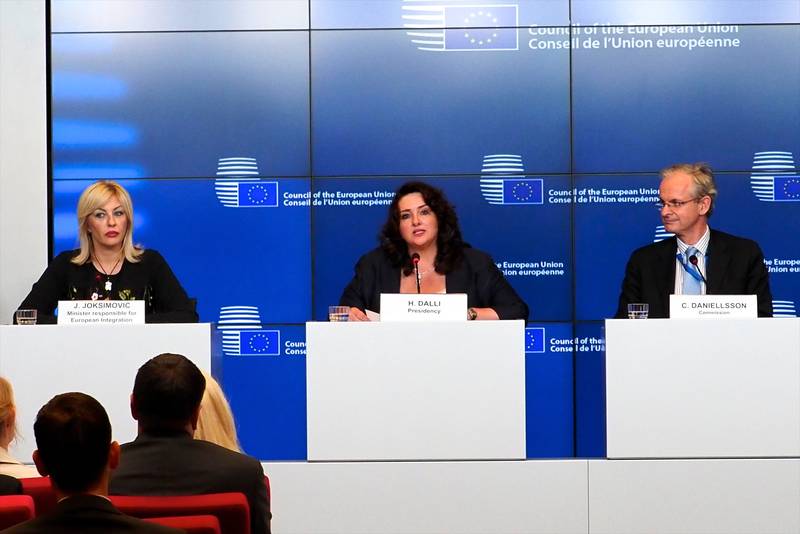 Although three months have passed since his election, the talk about this dialogue only came after the EU put away the carrot and pulled out the stick. This happened on July 14th during Mr Vučić's visit to Brussels. At that time European Council President Donald Tusk (Poland, EPP) explained to the Serbian president that it is time to make real choices, stop talking and take action. A few days later, Alexander Vučić gave an official invitation to all sections of society for a dialogue on the future of Kosovo. In a op-ed text [in Serbian], published in the semi-tabloid Blic, Vučić changed the record. Until recently, with his words and actions, he set the Serbian public against Kosovo, but in his text of this week he calls for realism.
Although three months have passed since his election, the talk about this dialogue only came after the EU put away the carrot and pulled out the stick. This happened on July 14th during Mr Vučić's visit to Brussels. At that time European Council President Donald Tusk (Poland, EPP) explained to the Serbian president that it is time to make real choices, stop talking and take action. A few days later, Alexander Vučić gave an official invitation to all sections of society for a dialogue on the future of Kosovo. In a op-ed text [in Serbian], published in the semi-tabloid Blic, Vučić changed the record. Until recently, with his words and actions, he set the Serbian public against Kosovo, but in his text of this week he calls for realism.
"It is my wish, as President of the Republic, to try and resolve our conflicts once and for all if possible, if it is not, that is fine", writes Mr Vučić. "It is time for Serbia to work, think, get and win without conflicts. I am sure we are able to do this even today. Just imagine what could happen! And do not be silent about it! All the roads for political co-operation and economic progress will open to Serbia, the door to the EU – as well", continues the text of the Serbian president, which is already provoking serious controversy. It is not yet clear which political forces will be involved in the discussion and how exactly. According to Serbian media, the president himself is not yet clear what will follow after this dialogue.
The conversation about the future of Serbia-Kosovo relations will not be easy at all and may take a lot of political energy and time. The big risk is that this could happen at the expense of key reforms, especially in the rule of law, the lack of which is again to be credited to Aleksandar Vučić himself and the rule of his party over the last five years. Technically, Serbia is progressing in the negotiation process. The sixth meeting of the Serbia Accession Conference was held in June with no celebrations and high-level presence, as well as zero media interest, during which two new chapters were opened - 7 (Intellectual Property Law) and 29 (Customs Union). So far, 10 out of 35 chapters have been opened with Serbia. Two of them are now closed. More chapters are expected to be opened by the end of the year.
Montenegro – an illusion of progress
This has, however, not been a benchmark for progress for a long time now, as exemplified by Montenegro. The country has also made a significant contribution to changing the dynamics of the enlargement process after it has managed to break away from the deadlock with Russia and become a full member of NATO. The country is considered to be the most advanced one, because it has begun negotiations on 28 out of 35 chapters, including the opening on 20 June of Chapter 22 (Regional Policy and Coordination of Structural Instruments) and Chapter 1 (Free Movement of Goods). At that time the negotiations on Chapter 30 (External Relations) were concluded and it was officially closed. Indeed, aligning of Montenegro's foreign policy with that of the EU is the country's biggest progress, same as last year, when euinside published an analysis of the state of enlargement.
Regarding the most important chapters - 23 and 24 - which concern the rule of law and media independence, Montenegro has made zero progress, and these are chapters that, if not closed, the country will not enter the EU. This system was first introduced precisely for Montenegro, because of the bitter experience with Bulgaria and Romania, which came with a special mechanism to monitor progress towards establishing an independent judiciary and rule of law, but after the serious problems that the EU currently has with Poland and Hungary it is more than certain that the candidates will be examined under a magnifying glass and long-term guarantees will be sought.
The statement, which was published after the Montenegrin accession conference on June 20, explicitly states that the work on chapters 23 and 24 is central to the overall pace of the negotiation process. Montenegro is praised for making progress from a legislative and institutional point of view, but there is no sufficient track record in the fight against corruption, organised crime, money laundering and violence against journalists. Special emphasis is placed on the importance of media freedom for the EU. The Montenegrin authorities are urged to step up their efforts to create a favourable environment for the development of investigative journalism and media freedom in general. In this sense, it was significant that after the conference no question was asked by the journalists present. Similar was the situation after the conference with Serbia.
Bosnia and Herzegovina – the Gordian Knot of enlargement
Will the Dayton creation start on the path of European integration is a question of great difficulty in the enlargement process. The country applied for membership last year and this year it received the mandatory questionnaire from the European Commission. However, filling it in is a very serious problem. The government's hopes are that by the end of August the questionnaire will be completed and can be given for translation, but according to the sceptics, BiH will not be ready with the questionnaire by the end of the year. Meanwhile, the country is also faced with a political crisis, with the possibility of a vote of no confidence in the government.
The EU's approach towards Serbia and Macedonia has become quite political, whereas towards BiH it is completely technical. This is a common mistake in the expansion process over the last decade. However, this mistake is costly when it comes to the most difficult and problematic countries in the queue for European membership. A signal of the complexity of the BiH case was the country's inability to sign the transport treaty in Trieste during the summit with the Western Balkan countries. The EU is currently in a position of waiting for the questionnaire answers, but it does not have a plan for what to do if it does not receive it within a reasonable timeframe. Shrugging in a "no questionnaire - no candidate status" style is not an option in this case.
Turkey remains in the freezer
This is the country that has virtually fallen out of the enlargement process, but no one dares to admit it out loud. With its current leadership and policy, Turkey cannot continue its European path. This week (July 25th), a political dialogue between the EU and Turkey was held, which reinforced the stalemate. The two sides failed to reconcile their positions on the most controversial issues of the rule of law, arrests of journalists and human rights defenders. The press conference after the long hours of dialogue was a continuation of it, as Mrs Mogherini said. For the EU, the rule of law, the right to a fair trial, freedom of expression and assembly, good relations with neighbours are the key to opening new chapters with Turkey. Until there is no progress on these points, there will be no opening of new chapters but the dialogue on topics of common interest will continue, which are mainly in the fields of foreign policy, energy and migration.
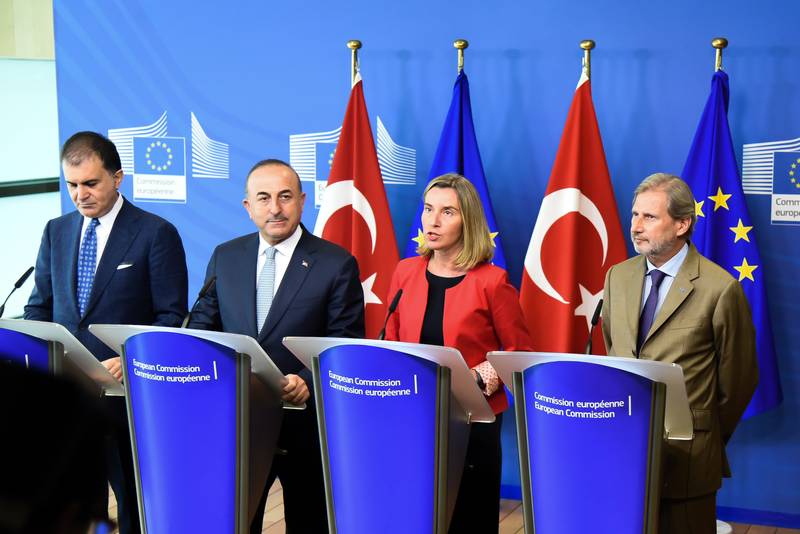 Turkey insists that the only way to solve the problem with the rule of law is by opening chapters 23 and 24. EU Commissioner for Enlargement Negotiations Johannes Hahn also agrees with this, but did remind, however, that it is the member states who insist on no new negotiation chapters being opened. "For the moment further opening is not possible", Han said in a flat tone of voice, while Turkish representatives - Foreign Minister Mevlüt Çavuşoğlu and Chief Negotiator with the EU Ömer Çelik - spoke heatedly, trying to explain that nothing done so far is against democracy and the rule of law. The political dialogue with Turkey fully reveals the completely opposite perceptions of what rule of law, democracy, freedom of media and civil society are.
Turkey insists that the only way to solve the problem with the rule of law is by opening chapters 23 and 24. EU Commissioner for Enlargement Negotiations Johannes Hahn also agrees with this, but did remind, however, that it is the member states who insist on no new negotiation chapters being opened. "For the moment further opening is not possible", Han said in a flat tone of voice, while Turkish representatives - Foreign Minister Mevlüt Çavuşoğlu and Chief Negotiator with the EU Ömer Çelik - spoke heatedly, trying to explain that nothing done so far is against democracy and the rule of law. The political dialogue with Turkey fully reveals the completely opposite perceptions of what rule of law, democracy, freedom of media and civil society are.
The change in the climate of enlargement is undeniable, but it is quite fragile. A twist may still come quite easily. Macedonian success depends greatly on the behaviour of the opposition inside the country and on how the situation with its name will be played. It is very important that the EU does not allow the name dispute to remain a bilateral issue, because no matter how much it is assumed that Serbia is the key to stability in the region, changes in Macedonia are those that have significantly changed the dynamics of the European integration process. In Serbia, the situation is even more fragile, as there is no genuine change there, but rather a change of a wolf in sheep’s skin.
So far, the EU is not pulling out the carrot of a date for accession, as Vučić wants, and it is good not to pull it out until it sees clear results - what follows after the dialogue on Kosovo, progress on chapters 23 and 24, changes regarding the media and a clear separation of powers. Montenegro should cease to be treated as the most advanced country only because it has opened the most chapters and because it has passed entirely to the Western camp. The domestic political situation is still uncertain and may be a source of problems in the future, the smallest of which will be continued lack of progress on the most important reforms.
While BiH is trying to fill in the questionnaire, it would be good for the EU to come up with a back-up plan that includes finding a solution to domestic tensions among ethnic groups in the country. The EU is currently burying its head in the sand, but this can not last long. If Serbia, not just in words, further approaches the EU and starts its detachment from Russia, BiH would remain the only instrument in Moscow's hands to destabilise the region through Miroslav Dodik. That is why Brussels must abandon the technical approach to the country and develop a long-term strategy.
Kosovo is still trying to form a government, but if Serbia starts transforming, it will also affect Kosovo, and it will be a catalyst for accelerating reforms in Albania too. Then Turkey will remain the most difficult task to solve. The EU has to answer the question of how long it can hold the talks with Turkey in the freezer and what are the possible options for the future. Doing nothing and waiting is not a solution, especially when the stake is millions of refugees and migrants and the EU's foreign policy interests in the Middle East region.
Translated by Stanimir Stoev
 Bakir Izetbegovic, Andrej Plenkovic | © Council of the EU
Bakir Izetbegovic, Andrej Plenkovic | © Council of the EU Aleksandar Vucic, Recep Tayyip Erdogan | © Serbian Presidency
Aleksandar Vucic, Recep Tayyip Erdogan | © Serbian Presidency Jean-Claude Juncker, Zoran Zaev | © European Commission
Jean-Claude Juncker, Zoran Zaev | © European Commission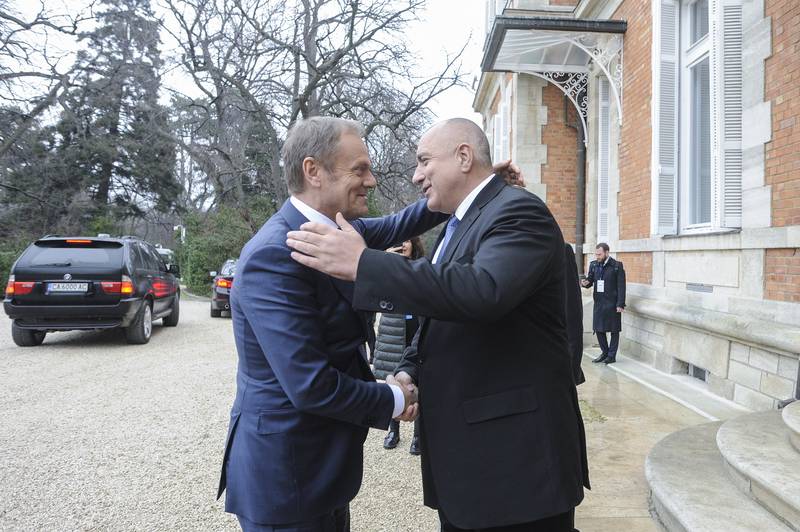 Donald Tusk, Boyko Borissov | © Council of the EU
Donald Tusk, Boyko Borissov | © Council of the EU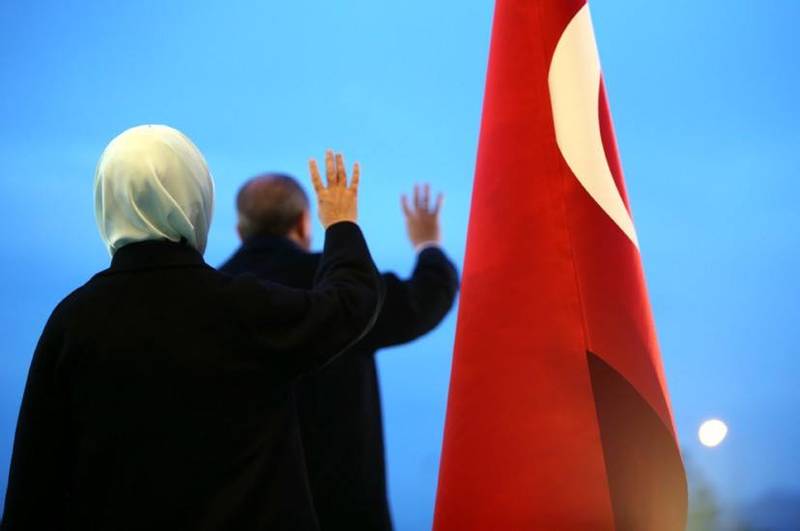 | © Turkey Presidency
| © Turkey Presidency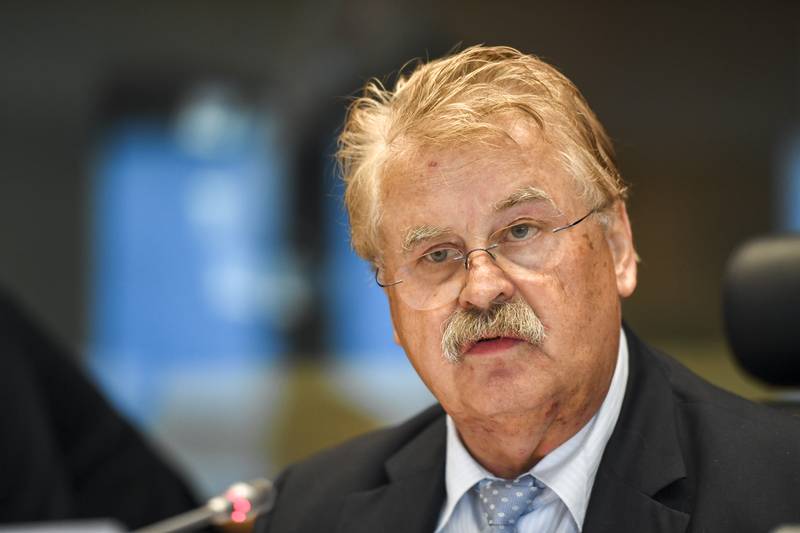 Elmar Brok | © European Parliament
Elmar Brok | © European Parliament